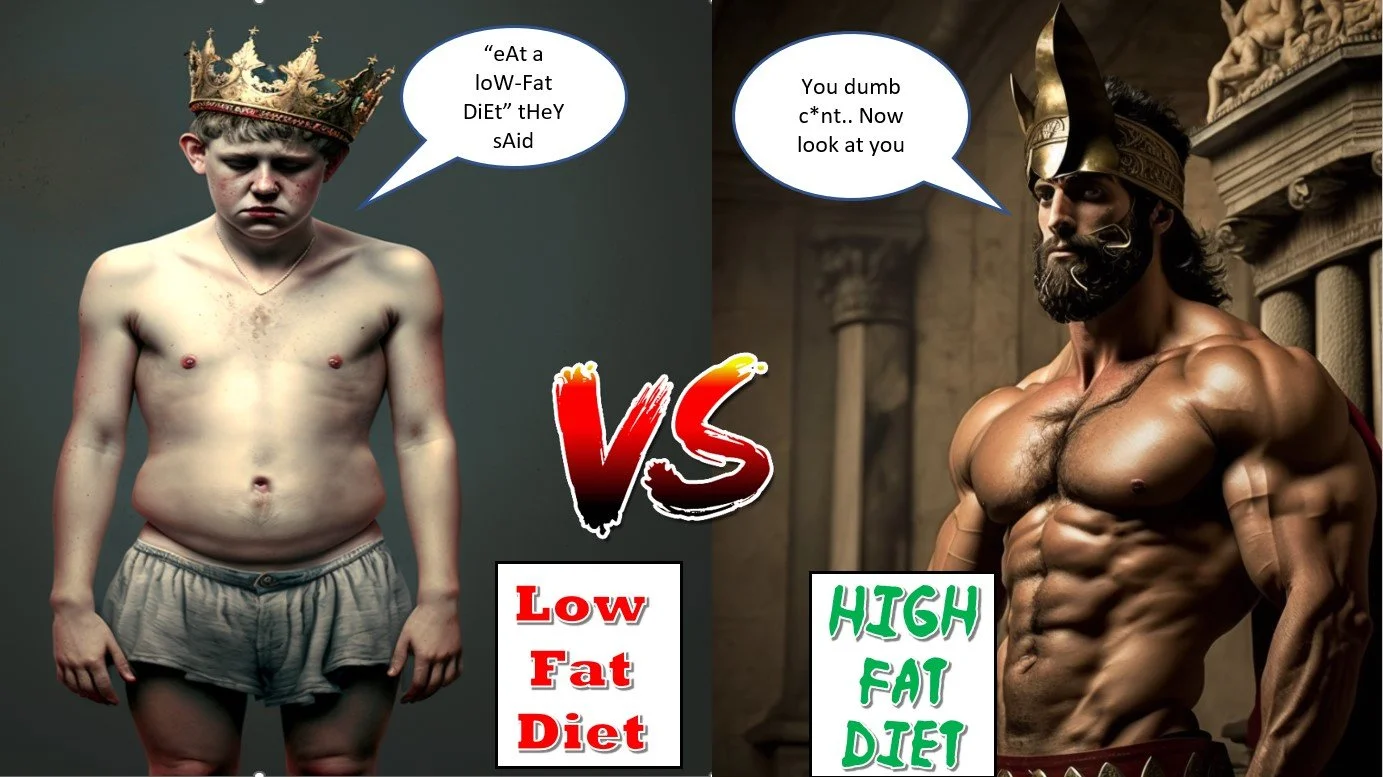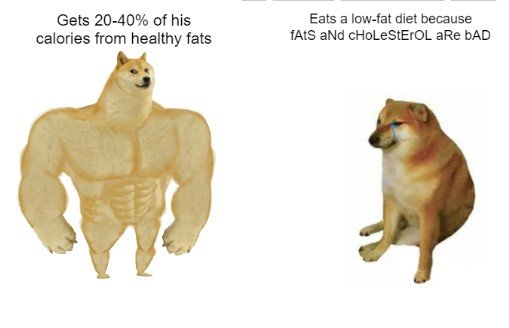How much Fat should you eat to boost Testosterone
A large amount of men don’t eat the optimal amount of dietary fat needed to increase Testosterone, despite several studies showing how important they are for testosterone production (S, S, S, S, S).
They have been lied to not only by mainstream media, but also by professional bodybuilders and influencers on steroids or other performance enhancing drugs who constantly advocate for low-fat diets (which obviously works if you’re on steroids since you’re getting your testosterone from an outside source).
Dietary fat plays such a crucial role in the production of testosterone, that it is no surprise why men who eat very low fat diets constantly complain of low sex drive, low energy, and reduced muscle mass and strength. They’re also plagued with chronic inflammation, since monounsaturated fats (MUFAs) and other healthy fats are vital for reducing inflammation and for the absorption of your key fat soluble vitamins such as vitamin A, vitamin E, Vitamin D, and vitamin K.
When men reintroduce the proper amounts of healthy fats into your diet, their energy goes through the roof, their sex drive increases, their blood pressure ameliorates, their inflammatory markers decrease, their insulin sensitivity improves, and their testosterone significantly increases even if calories are kept constant.
How much fat do you need to maximize testosterone production? Anywhere from 20 to 40% of your daily calories is the sweet spot. If you’re in a caloric surplus, or eat sufficient carbs, or already have decently high testosterone levels, you can get away with being on the low end of that range (near 20% of your calories from fat), but I don’t recommend going too far below that.
Remember that you need ALL healthy fats (saturated fats, MUFAs, and omega-3 fatty acids), and it can be quite difficult to get enough of all three if you try to get less than 20% of your calories from fats.
So for most people, start off with at least 20% of your calories from fats (or 55 grams of fat for for a 2500 kcal diet), and ideally more, and you will notice the difference within weeks if not days. Just be sure to avoid seed oils, trans-fats, and other bad fats.
🛒If you want the BEST science-based, all-in-one training program, meal plan, testosterone guide, fat loss guide, and more, purchase my HSP Training Nucleus Overload eBook here.
It combines the latest science and my roughly 20 years of experience in NATURAL Testosterone, Muscle, and Fat loss optimization to answer EVERY single critical question you may have about training, nutrition, fat loss, and testosterone boosting, using a SIMPLE, No-BS approach, and at a HUGE discount (limited time -40% off if you’re subscribed to my YouTube channel).
You will also get unlimited FREE updates to ANY future editions of the eBook as a courtesy for supporting the channel and movement. Buy it now 👇
🤵Join my social media accounts here:
📱YouTube: https://www.youtube.com/@team3dalpha
📱Discord: https://discord.gg/A29dDVXVcg
📱Reddit: https://www.reddit.com/r/team3dalpha
📱IG: https://www.instagram.com/team3dalpha
📱Tik Tok: https://www.tiktok.com/@team3dalpha
Watch the YouTube video for this article 👇
SOURCES
Sallinen J, Pakarinen A, Ahtiainen J, Kraemer WJ, Volek JS, Häkkinen K. Relationship between diet and serum anabolic hormone responses to heavy-resistance exercise in men. Int J Sports Med. 2004 Nov;25(8):627-33. doi: 10.1055/s-2004-815818. PMID: 15532008.
Volek JS, Kraemer WJ, Bush JA, Incledon T, Boetes M. Testosterone and cortisol in relationship to dietary nutrients and resistance exercise. J Appl Physiol (1985). 1997 Jan;82(1):49-54. doi: 10.1152/jappl.1997.82.1.49. PMID: 9029197.
Hämäläinen E, Adlercreutz H, Puska P, Pietinen P. Diet and serum sex hormones in healthy men. J Steroid Biochem. 1984 Jan;20(1):459-64. doi: 10.1016/0022-4731(84)90254-1. PMID: 6538617.
Lopez DS, Wulaningsih W, Tsilidis KK, Baillargeon J, Williams SB, Urban R, Rohrmann S. Environment-wide association study to comprehensively test and validate associations between nutrition and lifestyle factors and testosterone deficiency: NHANES 1988-1994 and 1999-2004. Hormones (Athens). 2020 Jun;19(2):205-214. doi: 10.1007/s42000-020-00179-w. Epub 2020 Feb 19. PMID: 32077039; PMCID: PMC7323003.
Whittaker J, Wu K. Low-fat diets and testosterone in men: Systematic review and meta-analysis of intervention studies. J Steroid Biochem Mol Biol. 2021 Jun;210:105878. doi: 10.1016/j.jsbmb.2021.105878. Epub 2021 Mar 16. PMID: 33741447.





